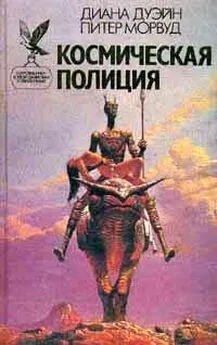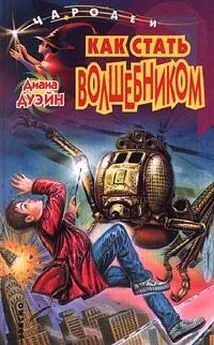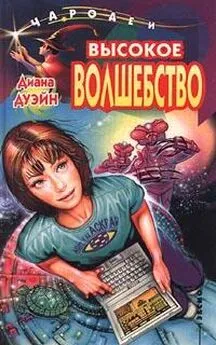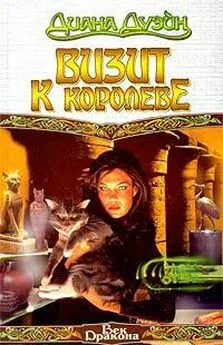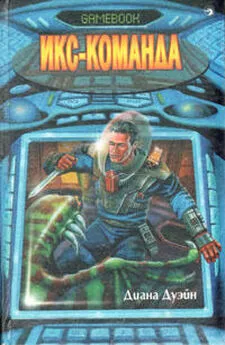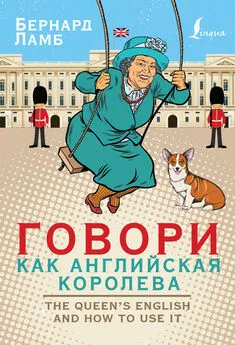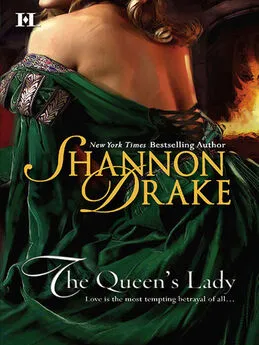Диана Дуэйн - To Visit the Queen
- Название:To Visit the Queen
- Автор:
- Жанр:
- Издательство:неизвестно
- Год:неизвестен
- ISBN:нет данных
- Рейтинг:
- Избранное:Добавить в избранное
-
Отзывы:
-
Ваша оценка:
Диана Дуэйн - To Visit the Queen краткое содержание
To Visit the Queen - читать онлайн бесплатно полную версию (весь текст целиком)
Интервал:
Закладка:
– and then suddenly light broke through again, the watery gray light of the morning he had just left: a few spits and spatters of rain reached him even here in the tunnel, blown in on that chilly wind. Some part of Patel's mind had now begun to go round and round with thoughts like How the heck is there daylight down here, I must be fifty feet underground and The smell, what is that smell?? – but that part of him felt strangely far away, like a mind belonging to someone else, in the face of what he saw before him. A street, and the gray day above it, those made sense: buildings pressing close on either side, yes, and the enamelled metal sign set high in the brick wall of the building opposite him, saying Coopers' Row, that was fine too: the math/business building of the University was up past the end of the Row, in Jewry Street, and he would have been heading there after meeting Sasha. But there was no pavement to be seen. There was hardly any road visible, either: it was covered ankle deep in thick brown mud, the source of the godawful smell. Must have been a sewer break, said some hopeful part of his mind, steadfastly ignoring the basic issue of how he was suddenly standing at ground level.
Patel walked forward slowly, trying not to sink into the mud, and failing – it came up over the tops of his shoes: boy, these trainers are going to be a loss after this, and they were only three weeks old, how am I going to explain this to Mum … ? Squelch, squelch, he walked forward, and came to the corner of Cooper's Row and George Street, looked down toward Great Tower Street in the direction of the Monument Tube station –It was not there. The road was lined with old buildings, three– or four-story brick edifices all crowded together where multi-story office buildings should have been. The traffic was gone, too. Or rather, it was all replaced by carriages, carriages pulled by horses, their hooves making a strangled wet clopping noise as they pounded through the mud, up and down Great Tower Street. Patel staggered, changed the bag mechanically from the right hand to the left, and took a few more steps forward, looking away from the traffic, don't want to see that, doesn't make sense, and across to the Tower.
It at least was still there: the great square outer walls defining the contours of Tower Hill stood up unchanged, the lesser corner towers reached upward as always, "the windvanes on them wheeling and whirling in the gusts of wind off the river – the wind that bore the stink forcefully into Patel's nostrils and the rain, now falling a little harder, into his face, cold and insistent. That wind got into his hair and tried to find its way under his jacket collar; and around him, the few trees sprouting from the unseen pavement rocked in the wind, their bare branches rubbing and ratcheting together. Bare. That was wrong. It was September. And other things were moving, rocking too –Momentarily distracted by the motion, he looked past the Tower, down toward Lower Thames Street and the great bend of the river which began there. A forest, he thought at first, and then rejected the thought as idiotic. No trees would be so straight and bare, with no branches but one or two sets each, wide crosspieces set well up the trunk: nor would trees be crowded so close together, or rock together so unnervingly, practically from the root. The "trees" were masts … masts of ships, fifty or seventy or a hundred of them all anchored there together, the wind and the water pushing at the ships from which the masts grew; and the bare shapes silhouetted against the morning gray were all rocking, rocking slightly out of phase, making faint uneasy groaning noises that he could hear even at this distance, for they were perhaps a quarter of a mile down the river from where he stood. From that direction too came a mutter of human voices, people shouting, going about their business, the sound muted by the wind that rose around him and rocked the groaning masts together –That groan got down inside Patel, went up in pitch and began to shake him until he rocked like the masts, staggering, falling, the world receding from him. The bag fell from Patel's hand, unnoticed.
A man came round the corner right in front of Patel and looked at him, then opened his mouth to say something.
Patel jumped, meaning to run away: but his raw nerves misfired and sent him blundering straight into the man. As Patel came at him, the strangely dressed man staggered hurriedly backward, panic-stricken, tripped and fell – then scrambled himself up out of the mud with an unintelligible shout and ran crazily away. Patel, too, turned to flee, this time getting it right and going back the way he had come. He ran splashing through the stinking mud, and, for all the screaming in his head, ran mute: ran pell-mell back toward sanity, toward the light, and (without knowing how he did it) finally out into the bare– bulb brilliance of the Underground station, where he collapsed, still silent, but with the screaming ringing unending in his mind, insistently expressing what the shocked and gasping lungs could not.
Later those screams would burst out at odd times: in the middle of the night, or in the gray hour before dawn when dreams are true, startling his mother and father awake and leaving Patel sitting frozen, bolt upright in bed, sweating and shaking, mute again. After several years, some cursory-psychotherapy which did nothing to reveal the promptly and thoroughly buried memory causing the distress, and a course of a somewhat overprescribed mood elevator, the screaming stopped. But when he and his wife and new family moved to the country, later in his life, Patel was never easy about being in any wooded place in the wintertime, at dusk. The naked limbs of the trees, all held out stiff against the falling night and moving, moving slightly, would speak to some buried memory which would leave him silent and shaking for hours. Nor was he ever able to explain, to Sasha, or to his parents, or anyone else, exactly what had happened to his copy of Van Nostrand's Scientific Encyclopedia. Mostly his family and friends thought he had been robbed and assaulted, perhaps indecently: they left the matter alone. They were right: though as regarded the nature of the indecency, they could not have been more wrong.
Patel fled too soon ever to see the men who came down along Cooper's Row after a little while, talking among themselves: men who paused curiously at the sight of the dropped book, then stooped to pick it up. One of them produced a kerchief and wiped the worst of the mud away from the strange material which covered the contents. Another reached out and slowly, carefully peeled the slick, thin white stuff away, revealing the big heavy book. A third took the book from the second man and turned the pages, marveling at the paper, the quality of the printing, the embossing on the cover. They moved a little down the street to where it met Great Tower Street, where the light was better: as they paused there, a ray of sun suddenly pierced down through the bleak sky above them, that atypical winter's sky here at the thin end of summer. One of the men looked up at this in surprise, for sun had been a rare sight of late. In that brief bright light the other two men leaned over the pages, read the words there, and became increasingly excited. Shortly the three of them hurried away with the book, unsure whether they held in their hands an elaborate fraud or some kind of miracle. Behind and above them, the clouds shut again, and a gloom like premature night once more fell over the Thames estuary … a darkness in which those who had ears to hear could detect, at the very fringes of comprehension, the sound of a slowly stirring laughter.
ONE
At just before 5:00 p.m. on a weekday, the upper track level of Grand Central Terminal looks much as it does at any other time of day: a striped gray landscape of long concrete islands stretching away from you into a dry, iron-smelling night, under the relentless fluorescent glow of the long lines of overhead lighting. Much of the view across the landscape will be occluded by the nine Metro-North trains whose business it is to be there at that time, and by the rush and flow of commuters through the many doors leading from the echoing Main Concourse to the twelve accessible platforms' near ends. The commuters' thousands of voices on the platforms and out in the Concourse mingle into a restless undecipherable roar, above which the amplified voice of the station announcer desperately attempts to rise, reciting the cyclic poetry of the hour: " … now boarding, the five oh two departure of Metro-North train number nine five three, stopping at One Hundred and Twenty-Fifth Street, Scarsdale, Hartsdale, White Plains, North White Plains, Valhalla, Hawthorne, Pleasantville, Giappaqua … " And over it all, effortlessly drowning everything out, comes the massive basso B-flat bong of the Accurist clock, echoing out there under the blue-painted backwards heaven, two hundred feet above the terrazzo floor.
Down on the tracks, even that huge note falls somewhat muted, having as it does to fight with the more immediate roar and thunder of the electric diesel locomotives, clearing their throats and getting ready to go. By now Rhiow knew them all better than any trainspotter, knew every engine by name and voice and (in a few specialized cases) by temperament … for she saw them every day in the line of work. Right now they were all behaving themselves, which was just as well: she had other work in hand. It was no work that any of the other users of the Terminal would have noticed – not that the rushing commuters would in any case have paid much attention to a small black cat, a patchy-black-and-white one, and a big gray tabby sitting down in the relative dimness at the near end of Adams Platform … even if the cats hadn't been invisible.
Bong, said the clock again. Rhiow sighed and looked up at the elliptical multicolored shimmer of the worldgate matrix which hung in the air before them, the colors that presently ran through its warp and woof indicating a waiting state, no patency, no pending transits. Normally this particular gate resided between tracks Twenty-Three and Twenty-Four at the end of Platform K; but for today's session they had untied the hyperstrings holding it in that spot, and relocated the gate temporarily on Adams Platform. This lay between the Waldorf Yard and the Back Yard, away off to the right of Tower C, the engine inspection pit, and the power substation: it was the easternmost platform on the upper level, and well away from the routine trains and the commuters … though not from their noise. Rhiow glanced over at big gray tabby Urruah, her colleague of several years now, who was flicking his ears in irritation every few seconds at the racket. Rhiow felt like doing the same: this was her least favorite time to be here. Nevertheless, work sometimes made it necessary. Bong, said the clock: and clearly audible through it, through the voices and the diesel thunder and the sound of the slightly desperate-sounding train announcer, a small clear voice spoke. "These endless dumb drills," it said, "lick butt."
WHAM! – and Arhu fell over on the platform, while above him Urruah leaned down, one paw still raised, wearing an expression that was surprisingly mild – for the moment. "Language," he said.
"Whaddaya mean?! There's no one here but you and Rhiow, and you use worse stuff than that all the – "
WHAM! Arhu fell over again. "Courtesy," Urruah said, "is an important commodity among wizards, especially wizards working together as a team. Not to mention mere ordinary people working as teams or in– pride, as you'll find if you survive that long. Which seems unlikely at the moment. My language isn't at question here, and even if it were, I don't use it on my fellow team members, or to them, even by implication."
Интервал:
Закладка:

